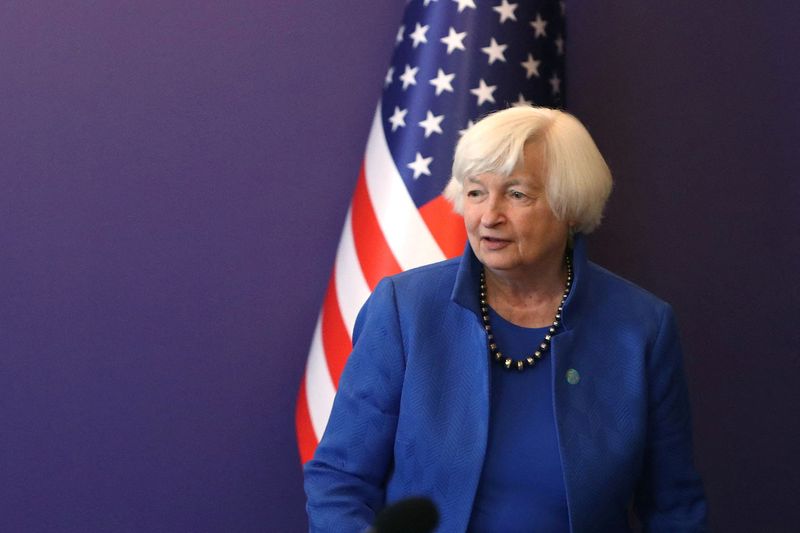By David Lawder
WASHINGTON (Reuters) - U.S. Treasury Secretary Janet Yellen said on Thursday a second-quarter contraction of U.S. economic output was a sign of an inevitable and significant slowdown, but there was still broad strength in the economy, especially in jobs.
During a news conference, Yellen did not rule out a possible recession as the Federal Reserve and the Biden administration strive to bring down inflation from 40-year highs. But she refused to concede that one was underway after two quarters of GDP contraction - a shorthand definition often used by economists, journalists and market analysts.
She said most Americans define recessions as similar to those that have occurred in the past: "Substantial job losses and mass layoffs, businesses shutting down, private sector activities slowing considerably, family budgets under immense strain ... a broad-based weakening of our economy." Yellen said. "That is not what we're seeing right now."
Her remarks extended the Biden administration's concerted pushback against recession talk after the Commerce Department reported earlier on Thursday that U.S. GDP shrank 0.9% in the second quarter, on top of a 1.6% contraction in the first quarter.
INFLATION, NOT JOBS
She said economists should avoid a "semantic battle" over the state of the economy, but said Americans' main concern about the economy was about inflation and rising costs, not jobs.
"I think the discomfort that households feel, it's not because of the job market. Jobs are readily available," she said.
But the labor market remains extremely tight and is a contributor to inflation, she said, adding that some of this upward wage pressure could be reduced while still maintaining full employment.
She said there were some signs that other inflationary pressures were starting to recede, but it was unclear how long this process would take, including easing automotive and supply-chain bottlenecks that have dogged the economy for more than a year.
The Treasury chief last year had argued that inflation would be "transitory," receding as supply-chain disruptions eased. But inflation has proven more persistent - consumer prices rose at a 9.1% annual pace in June - and she admitted in late May that she was "wrong" about the path inflation would take.
Asked whether she was committed to staying at Treasury until inflation and growth stabilize, Yellen said: "I will stay in this role as long as President Biden finds my contributions to be useful. I serve at his pleasure."
FOOD INFLATION
Yellen said the second-quarter GDP contraction was due largely to changes in volatile private goods inventories and the drag from lower government spending. But consumer spending growth, particularly on services, was encouraging.
"This report indicates an economy that is transitioning towards sustainable growth," Yellen said.
But the GDP report showed second-quarter consumer spending growth at 1%, down sharply from 1.8% in the prior period, and residential investment sinking at a rate of 14%.
Indeed, food inflation was a major drag on second-quarter GDP. While nominal spending on food for consumption at home was up by $5.9 billion, Americans' "real" food consumption adjusted for the highest inflation in four decades tumbled by $33.5 billion from a quarter earlier, creating its largest drag on the economy in nearly half a century.

Reacting to the data, some economists and market analysts were already starting to declare a "technical" recession.
"These are disappointing numbers, obviously, and the first quarter was revised lower," said Peter Cardillo, chief market economist at Spartan Capital Securities in New York. "The market has been forecasting a recession. From a textbook viewpoint, this is a recession and a mild one."